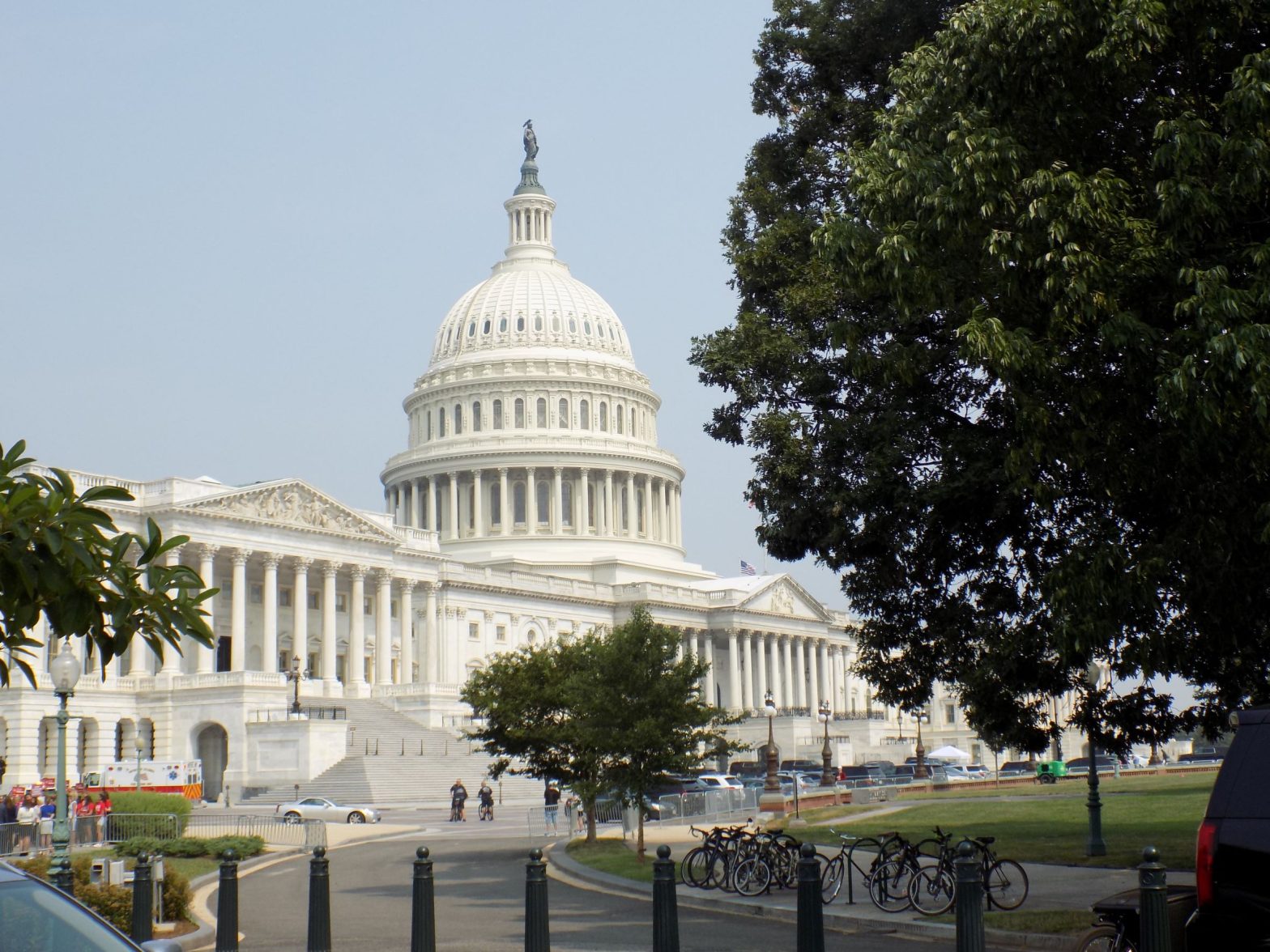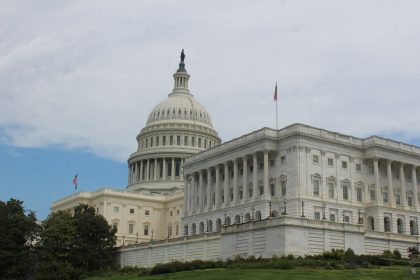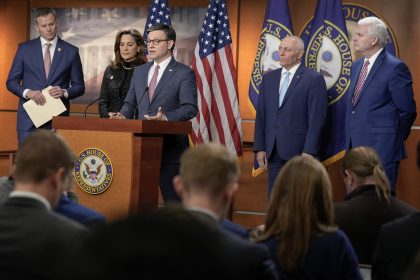House Inching Toward Passing Continuing Resolution with Debt Ceiling Increase

WASHINGTON — House Democrats were inching closer Tuesday afternoon to passing legislation that would both keep the government funded through December and waive the federal debt limit through the end of 2022.
But even as the bill cleared the House Rules Committee and headed toward a final vote Tuesday night, there was no evidence at all that Republicans were going to go back on their promise to block the legislation in the Senate.
Speaking to reporters on Capitol Hill following the Republicans weekly caucus luncheon, Senate Minority Leader Mitch McConnell said the caucus stands ready to support a continuing resolution so long as it includes disaster relief for Louisiana and additional funds to support Israel’s Iron Dome air defense system.
That latter requirement became a bold faced problem Tuesday after a group of progressives in the House told Democratic leaders that they would not vote for the bill as is because it included $1 billion in funding for Israel’s Iron Dome.
The disagreement caused the House Rules Committee to go into recess. When it returned, all mention of the Iron Dome defense system had been excised from the bill under consideration.
But McConnell continued, saying what his caucus is not prepared to do “is to relieve a Democrat president and a Democratic House and a Democratic Senate of their governing obligation to address the debt ceiling.”
“The previous debt ceiling was negotiated on a bipartisan basis. This one is not being negotiated because obviously, we are not involved in any bipartisan discussions regarding the legislation that they apparently have some challenges in putting together,” he said.
Senate Republican Conference Chairman John Barrasso, of Wyoming, noted that since 1939, the federal government’s debt ceiling has been raised 98 times.
“So why is it any different this time?” he asked rhetorically. “Well, it’s because of the blowout spending the Democrats are proposing — and doing it without a single Republican vote.
“Traditionally, when you have to raise the debt ceiling, you have a bipartisan discussion about ways to get spending under control. With a 50/50 Senate and such a close margin in the House, those kinds of discussions are exactly what should be happening right now,” Barrasso said. “Instead, the Democrats are moving forward with an incredible spending bill.”
The senator, of course, was referring to the proposed $3.5 trillion reconciliation bill that, if passed, would accomplish much of President Joe Biden’s legislative agenda in one fell swoop.
Before Democrats in either chamber can get to that vote however, they have to avoid a government shutdown. House Appropriations Committee Chair Rosa DeLauro, D-Conn., introduced a 94-page bill she hoped would do just that, Tuesday morning.
The main portion is a continuing resolution that would fund the government and keep the lights on through Dec. 3. The legislation also included two emergency supplemental funding bills, one that would provide $28.6 billion in disaster relief and another $46.3 billion to address the humanitarian needs of evacuees from Afghanistan.
In remarks before the House Rules Committee Tuesday, DeLauro said the continuing resolution would support working families by funding an array of education, health, housing and public safety programs while ensuring “we can continue to help the most vulnerable.”
“The funding in this bill invests in early childhood education, our schools, and high quality training programs. It protects public health, it safeguards our consumers from dangerous products and unsafe food. It will support hungry families, provide housing for those who need a place to live. And it will help keep our communities and our entire nation safe,” she said.
But even as she pitched the bill DeLauro admitted it is not a long-term solution for funding the government.
“It simply allows additional time for bicameral, bipartisan negotiations on a final year bill for fiscal year 2022,” she said.
DeLauro noted that as things stand now, the House has passed nine of the 12 appropriations bills that comprise the annual federal budget, while the Senate has passed only three.
She said passage of the continuing resolution is necessary to give the Senate time to finish its work on the budget, at which time House and Senate negotiators will be able to get together and work out the differences in the two spending proposals for 2022.
“But even as we provide for these vital efforts, we cannot wait until December to address climate emergencies that require federal resources. That’s why this legislation includes emergency supplemental appropriations to respond to recent disasters and to address needs created by recent developments in Afghanistan as a result of ending the 20 year war,” she said.
Immediately throwing his support behind the bill was Sen. Patrick Leahy, D-Vt., chairman of the Senate Appropriations Committee.
“I intend to do everything I can to complete the appropriations bills by Dec. 3, in order to make smart choices for the American people and to avoid a full-year continuing resolution,” he said. “That would not be in either parties’ interest and it would certainly not be in the interest of the American people. Passing the regular appropriations bills is each of our responsibility.”
Leahy also took aim at his Republican colleagues, saying they’ve “spent an inordinate amount of time posturing over this increase, as though they have no idea how we got here.
“The reality is that while President Trump was in office, U.S. debt increased $8 trillion dollars — $5.5 trillion alone since we last raised the debt ceiling with bipartisan support under former President Trump in 2019,” the senator said.
“Republican’s irresponsible tax cut for the wealthiest Americans is partly to blame, yet Democrats supported the Trump administration when it needed to raise the debt limit to account for the resulting bills,” he continued. “Democrats voted for this increase because to do otherwise would have been irresponsible and dangerous for the United States economy. We have seen this page from the Republican playbook before: a vote of convenience when their party is in the White House, and a political football when they are not. It is as irresponsible as it is irrational.”
Leahy added, “The bill before the House would raise the debt ceiling only enough to cover the amount of money the U.S. incurred in just one of the bills we passed on a bipartisan basis to respond to the COVID epidemic – the $908 billion dollar bill that Republicans championed through the Senate, that 40 Republicans voted for, and that President Trump signed into law.
“It is time we come together as Americans and stop posturing. We need to do the right thing and pass this bill into law,” Leahy said.
If the Senate Republicans ultimately block the continuing resolution/debt limit bill, the Democrats’ options appear to be minimal. About all they could do was add the debt-limit increase to the reconciliation package by amending the budget resolution.
That would, however, be a time-consuming process and bring the government right to the brink of a possible shut down.























